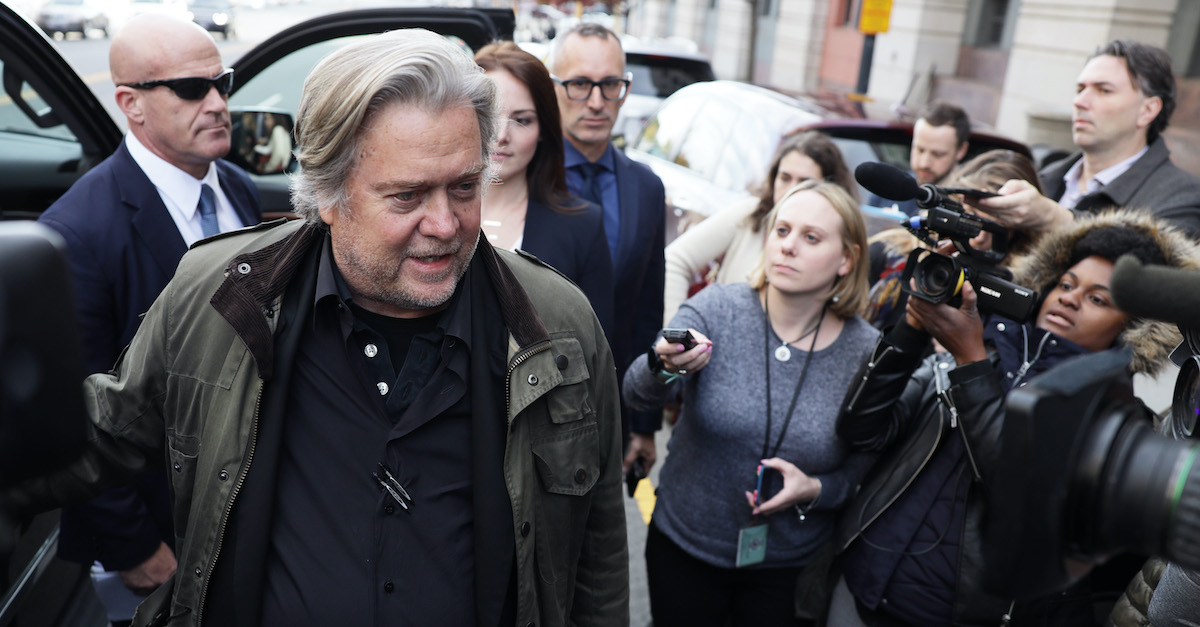
The sole remaining defendant accused of conspiring to defraud donors of We Build the Wall should not be allowed to tell a federal jury that former President Donald Trump pardoned his ex-chief strategist Steve Bannon of the same charges, federal prosecutors told a judge.
Prosecutors also want to prevent Timothy Shea’s lawyers from arguing that We Build the Wall’s backers were “gullible.”
“Impermissible Speculation”
Of the four men initially indicted in the We Build the Wall case, only Shea is prepared to stand trial. We Build the Wall’s president Brian Kolfage and Andrew Badolato are currently expected to plead guilty on April 21. Trump pardoned Bannon—but not his alleged co-conspirators—during the twilight of his presidency.
Shea, the last man standing, previously reached an agreement “in principle” that would have averted a trial, before those talks collapsed for reasons unknown.
All four were charged with conspiring to defraud donors in We Build the Wall, a crowdfunding effort to build a U.S.-Mexico barrier along the southern border. The charity claimed that every “penny” of the $25 million raised would go toward construction, but prosecutors say that Bannon pocketed $1 million. Kolfage took $350,000 and bought a yacht, a Range Rover SUV, a golf cart, jewelry, and cosmetic surgery with donors’ money, according to the indictment.
Prosecutors say that Shea secretly funneled a $20,000 monthly salary to Kolfage through an anonymous LLC used as a shell company. In return, Shea allegedly received hundreds of thousands of dollars. He is currently slated to stand trial on May 16.
In an 11-page motion filed on Thursday, prosecutors asked presiding U.S. District Judge Analisa Torres to keep Shea from making certain arguments. One of those concerns an elephant in the room—or rather, not in the room.
“The issuance of a pardon to Bannon and the disposition of the charges against him would invite the jury to engage in such impermissible speculation and would otherwise have no bearing on the questions of fact this jury will be asked to resolve at the defendant’s trial,” Assistant U.S. Attorney Alison Moe wrote in her motion. “Accordingly, the Court should preclude any evidence or argument relating to the pardon, which could only be offered in service of impermissible jury nullification arguments.”
Trump never provided any explanation why he pardoned Bannon and not his accused co-conspirators for the same charged crimes. Only Bannon served in Trump’s White House.
“Blaming His Victims”
Prosecutors also want to keep Shea from arguing that his alleged victims “acted negligently or gullibly.”
“The diligence and sophistication of those the defendant and his co-conspirators targeted during this scheme to defraud are not appropriate considerations at trial,” prosecutors noted. “Indeed, in proving a scheme to defraud, the government is ‘not required to show that the intended victim was actually defrauded.’ […] Nor should the defendant be able to use his and his co-conspirators’ own ruse against their victims by suggesting that, had they only asked certain questions or taken certain steps, they would have known that they were being provided false or misleading information.” [citations omitted]
“In short, the defendant should be precluded from blaming his victims—whether through argument or evidence elicited through direct testimony or cross examination—because such evidence is irrelevant and would violate Rule 403,” the brief continues, referring to the federal rule of evidence excluding information that would cause prejudice, confusion, or waste time.
On Friday, Shea’s attorney John Meringolo filed a defense motion to exclude evidence, which does not refer to Bannon’s pardon or the alleged gullibility of We Build the Wall donors.
Instead, it tries to exclude evidence of an alleged threat Shea conveyed to Badolato through a government witness.
“The government also seeks to admit evidence that in July 2021, Mr. Shea conveyed to a witness that he believed co-defendant Andrew Badolato was cooperating with the government and that Badolato should ‘in sum and substance’ ‘watch his back’ because Mr. Shea ‘knows people in a New York mafia crime family,'” the defense brief reads.
Meringolo insists that the claim is “meritless” and that his client Shea “never set foot in New York,” except once for a family vacation.
“He is unequivocally and definitively unrelated to, and unassociated with, any individual or group that could even conceivably be described as such,” the brief continues. “The government’s false allegations, if not so consequential to this very important moment in Mr. Shea’s life, would be laughable.”
Meringolo declined to comment.
Read the motions in limine, below:
(Photo by Alex Wong/Getty Images)